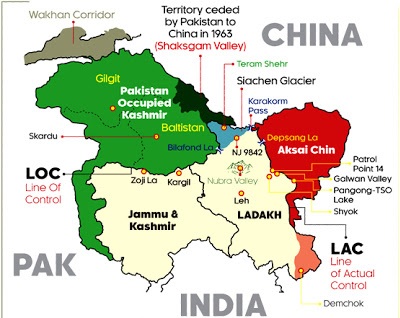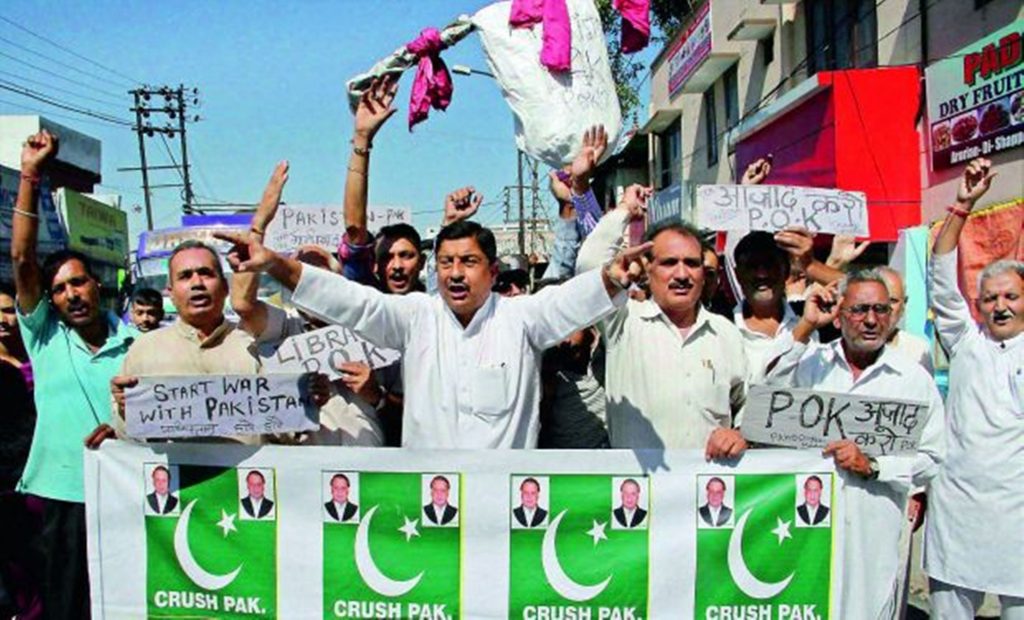
(Translated from the original in Kannada on Samvada.org)
After the British left India, the princely state of Jammu and Kashmir ruled by Maharaja Hari Singh of the Dogra Dynasty acceded to the Union of India on October 26, 1947. Jammu and Kashmir has been an integral part of India since time immemorial. However, Pakistan’s nefarious ploy to illegally usurp Jammu & Kashmir in the aftermath of the partition of the country in 1947, was bolstered by Prime Minister Nehru’s reckless move to take the issue to the United Nations. This resulted in the declaration of a ceasefire resulting in Pakistan sitting over 90,000 kms of India’s territory including the Gilgit-Baltistan and Shaksgam valley, even before the Indian army could repel and oust Pakistan from the occupied areas.
In 1963, Pakistan gifted about 5 thousand sq. kms of Shaksgam Valley which it had illegally occupied to China. The implementation of Article 370 and politics around it, Pakistani-sponsored jihadi terrorism and the appeasement of the Muslim leaders in the Kashmir Valley ensured that the issue of taking back the areas illegally occupied by Pakistan and China were forgotten. Although our brave soldiers fought and defeated Pakistan on the battlefield in the wars of 1965 and 1971, India suffered setbacks due to treaties and negotiations which made sure that the land under the illegal occupation of Pakistan was not freed.
Against this backdrop, the resolution adopted unanimously by both Houses of Parliament on February 22, 1994 is significant. The resolution unequivocally condemned Pakistan for aiding and abetting terrorism in India through training terrorists in terror camps in the occupied territories of Jammu & Kashmir. In addition, the resolution firmly declared the following:
(a) The State of Jammu & Kashmir has been, is and shall be an integral part of India and any attempts to separate it from the rest of the country will be resisted by all necessary means;
(b) India has the will and capacity to firmly counter all designs against its unity, sovereignty and territorial integrity;
and demands that –
(c) Pakistan must vacate the areas of the Indian State of Jammu and Kashmir, which they have occupied through aggression; and resolves that –
(d) all attempts to interfere in the internal affairs of India will be met resolutely.”
(The full text of the Parliamentary Resolution is reproduced in the Appendix)
This Parliament Resolution of 22 February 1994, once again emphasized the fact that territories illegally occupied by Pakistan belonged to India and made it clear that it was committed to reclaiming it. Since then, February 22 is also known as “Sankalp Divas”.
But the resolution to reclaim the territories has not been successful so far, and efforts in that direction have not borne fruits. However, with the impact of Article 370 on Jammu and Kashmir ending in 2019 with its abrogation, bifurcation of the state and making it a union territory, ending the stranglehold of vested interests in the state, and most importantly the path breaking and effective policies followed by the Narendra Modi government with respect to Jammu and Kashmir have rekindled hope of reclaiming the occupied territories from Pakistan.
It is true that the issue of Pakistan-occupied Kashmir came to the fore again after India’s decisive move to repeal Article 370, a demand of more than half a century. When the question of POJK arose, India’s Defence and Foreign Minister’s have expressed that appropriate action will be taken when the time is ripe. Army Chief General MM Naravane too has said that “There is a parliamentary resolution that the entire J&K is part of India. If Parliament wants it, then, that area (PoK) also should belong to us. When we get orders to that effect, we’ll take appropriate action”.

On the other hand, people living in the regions under the illegal occupation of Pakistani are also raising their voice against the atrocities and human rights violations committed by its armies and troops. There is a large section of people who want the territories to re-join India. Opposition is also mounting against the Chinese presence in the Gilgit-Baltistan region, which the Pakistan government plans to declare as its fifth province, through which the China-Pakistan Economic Corridor (CPEC) passes.
Residents of Gilgit-Baltistan who have migrated to European countries have been fighting from abroad to liberate the region from Pakistan and rejoin it with India. Further, Pakistan has further weakened due to freedom movements growing each day in the provinces of Sindh and Balochistan demanding independence. Given these developments, are we close to the liberation of the occupied territories? The hope has been renewed.
On the eastern side, about 38 thousand sq. kms in the Aksai Chin region of Ladakh, which was occupied in the 1962 war, and 5 thousand sq. Km of Shaksgam valley is under the illegal occupation of Communist China. This region too was a part of the undivided princely State of Jammu & Kashmir under Maharaja’s rule. There are frequent cross-border incursions across the line of control by the troops of expansionist China. Can India reclaim the territories under the occupation of China? We have to wait and watch.
Appendix
The resolution was unanimously adopted on February 22, 1994, by both Houses of Parliament. The resolution has not been revoked or amended so far. Below is the full text of the resolution.
“This House”
- Notes with deep concern Pakistan’s role in imparting training to the terrorists in camps located in Pakistan and Occupied Kashmir, the supply of weapons and funds, assistance in infiltration of trained militants including foreign mercenaries into Jammu and Kashmir with the avowed purpose of creating disorder disharmony and subversion.
- Reiterates that the militants trained in Pakistan are indulging in murder, loot and other heinous crimes against the people, taking them hostage and creating an atmosphere of terror;
- Condemns strongly the continued support and encouragement Pakistan is extending to subversive and terrorist activities in the Indian state of Jammu & Kashmir;
- Calls upon Pakistan to stop forthwith its support to terrorism, which is in violation of the Simla Agreement and the internationally accepted norms of inter-State conduct and is the root cause of tension between the two countries;
- Reiterates that the Indian political and democratic structures and the Constitution provide for firm guarantees for the promotion and protection of human rights of all its citizens;
- Regards Pakistan’s anti-India campaign of calumny, and falsehood as unacceptable and deplorable.
Notes with deep concern the highly provocative statements emanating from Pakistan urges Pakistan to refrain from making statements which vitiate the atmosphere and incite public opinion Expresses regret and concern at the pitiable conditions and violations of human rights and denial of democratic freedoms of the people in those areas of the Indian State of Jammu and Kashmir, which are under the illegal occupation of Pakistan;
On behalf of the People of India,
Firmly declares that:
a) The state of Jammu & Kashmir has been, is and shall be an integral part of India and any attempts to separate it from the rest of the country will be resisted by all necessary means;
b) India has the will and capacity to firmly counter all designs against its unity, sovereignty and territorial integrity;
and demands that –
c) Pakistan must vacate the areas of the Indian State of Jammu and Kashmir, which they have occupied through aggression;
and resolves that –
d) All attempts to interfere in the internal affairs of India will be met resolutely.
The Resolution was unanimously adopted, Mr. Speaker: The Resolution is unanimously passed.
February 22, 1994
(Source – Parliamentary Debates: Official report, Volume 170, Issue 2, 1994)
